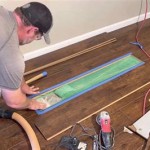Transform Your Concrete Floors with Vinyl Tiles: A Step-by-Step Guide
Tired of your dull concrete floors? Vinyl floor tiles offer an easy and cost-effective way to upgrade any room. With their durable construction and endless design possibilities, vinyl tiles can instantly elevate the look and feel of your space. Here's a comprehensive guide to help you lay vinyl floor tiles on concrete with precision and ease.
Materials You'll Need:
- Vinyl floor tiles
- Measuring tape
- Pencil or chalk
- Spreader or notched trowel
- Vinyl adhesive
- Utility knife
- Tapping block or rolling pin
Step 1: Prepare the Concrete Surface
Ensure that the concrete surface is clean, dry, and free of any debris or imperfections. Use a vacuum cleaner to remove dust and dirt. If there are any cracks or uneven areas, fill them with a concrete patch and let it cure according to the manufacturer's instructions.
Step 2: Measure and Plan the Layout
Determine where the center of the room is and mark it as a starting point. Measure the distance from the center to the walls on all four sides. Subtract 1 inch from each measurement and mark the new starting point on the wall. This will help you ensure that the tiles are evenly spaced around the room.
Step 3: Apply the Vinyl Adhesive
Use a spreader or notched trowel to apply a thin, even layer of vinyl adhesive to the concrete surface. Start at the center point and work your way outwards towards the walls. Follow the manufacturer's instructions for the specific adhesive you are using.
Step 4: Lay the Vinyl Tiles
Align the first tile with the starting point you marked earlier. Carefully place the tile on the adhesive, pressing down firmly. Continue laying the tiles in rows, ensuring they are evenly spaced and aligned with each other. Use a utility knife to trim any excess tiles around the edges of the room.
Step 5: Tap and Roll the Tiles
Once all the tiles are laid, use a tapping block or rolling pin to tap down on each tile and ensure a strong bond with the adhesive. Start from the center and work your way towards the edges. This will help eliminate air bubbles and create a smooth, even surface.
Step 6: Trim Excess Tiles
Use a utility knife to carefully trim any excess tiles around the edges of the room. Be sure to measure and mark the tiles to ensure a clean and precise cut. Replace any damaged or chipped tiles as necessary.
Step 7: Cure and Seal the Floor
Allow the adhesive to cure for the recommended time, usually 24-48 hours. Once cured, apply a sealer to the vinyl floor tiles. This will help protect them from wear and tear and enhance their durability. Allow the sealer to dry completely before using the floor.
Tips for Success:
- Use high-quality vinyl floor tiles and adhesive for best results.
- Take your time during the installation process to ensure accuracy and avoid mistakes.
- Double-check measurements and make sure the tiles are aligned correctly before pressing them down.
- Don't apply too much pressure when tapping or rolling the tiles, as this can damage them.
- If you make a mistake, remove the tile immediately and reapply it with fresh adhesive.

How To Install L And Stick Vinyl Tile On Concrete Floor Self Installation

Tips For Installing Vinyl Plank Over Concrete Floors Lemon Thistle

How To Install L And Stick Vinyl Tiles Houseful Of Handmade

How To Install Vinyl Floors

Concrete Subfloor Preparation For The Vinyl Floor Installation How To Diy Mryoucandoityourself

How To Install A Vinyl Floor Do It Yourself

Installing Luxury Vinyl Flooring On Concrete What You Need To Know 50floor

How To Encapsulate Vinyl Tile With Concrete Topping Part 1 3

Installing Vinyl Plank Flooring How To Fixthisbuildthat

How To Install Vinyl Or Laminate Floors In A Basement Over Concrete Slab
See Also







